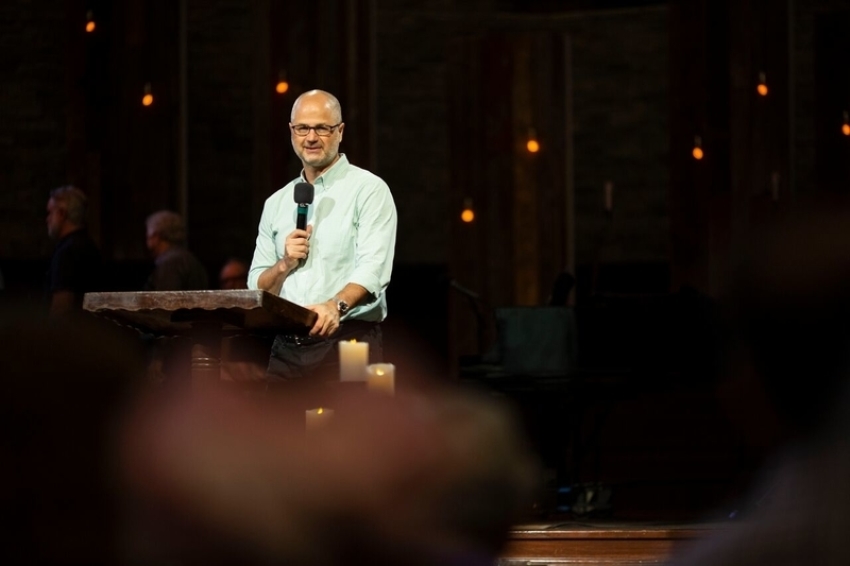Scott Sauls on embodying Christ's gentleness in culture; why Christians should feel politically 'homeless'

In an “us vs. them” culture, Christians are called to embody the gentleness of Christ, which is the “secret weapon” to diffusing anger, easing tension, and defeating evil and injustice.
That’s according to Scott Sauls, senior pastor of Christ Presbyterian Church in Nashville, Tennessee, who in an interview with The Christian Post, said he’s “concerned” by the number of professing Christians “caught up in partisan bickering.”
“It’s easy to conflate our Christianity with our politics as if the two were one and the same,” he said. “The reality is, neither the political left nor the right is clean in terms of their representation of the Kingdom of God.”
Sauls, who previously served as the lead and preaching pastor at Redeemer Presbyterian Church in New York City alongside Pastor Tim Keller, encouraged Christians to “become more nuanced in our political engagement, become willing to critique the party that we align with, and also affirm the party that we don't align with.”
“In some respects, we ought to feel politically homeless,” he said. “And that doesn't mean we all need to become moderates. But we all need to transcend the American political system just as Jesus transcended the political system that He was part of. When we give our whole selves to Jesus, it will become utterly impossible for us to give ourselves wholesale to a political party.”
Sauls stressed that there is a “more Christian way than the partisan way,” adding: “We need become people of a gentle answer.”
According to the pastor, before Christians are able to truly practice gentleness both within the church and to the outside world, they must “be in a position first to receive what Christ has for us as the one who calls Himself the one who has meek and gentle and heart who gives rest to the weary into the burdened.”
Throughout his earthly ministry, Jesus exemplified what it means to be “gentle,” Sauls said.
“He befriends the sinner in all of us instead of rejecting us; He goes toward us in forgiveness and grace; He reforms the pharisee in us and leads us to a place of humility, and disarms the cynic in all of us,” the pastor explained.
“Once you have an understanding of where you stand with the one who calls Himself meek and gentle, then we can get into the harder conversations of what real gentleness looks like,” he continued. “When we practice gentleness, we grow thicker skin. We do not anger easily. We receive criticism graciously. We forgive all the way. We bless our own betrayers.”
“We need to understand the posture of Jesus before we can presume to become like Him,” he stressed. “We become like Him by being with Him.”
Saul’s latest book, A Gentle Answer, offers a vision for how Christians can practice gentleness in a culture largely defined by outrage and cynicism.
The idea for the book, Sauls told CP, was conceived two years ago, a time he described as the “midway point” between the 2016 and 2020 presidential elections.

“2016 did not go very well in terms of being a unifying season, even among Christians,” he recalled. “So I thought 2020 would be a good time to present a better way of engaging with one another.”
But when 2020 hit, “we didn’t even start talking about the election until a few weeks ago because so much has happened between COVID-19 and racial pain and Jeffrey Epstein, etc.,” Sauls said.
“I'm actually simultaneously grieved that the world is in the condition that it is right now, but also thankful to be able to be part of the conversation with what seems like a timely release for anything that has to do with gentleness,” he added.
Though sometimes used interchangeably, “niceness” and “gentleness” are wildly different — and sometimes opposing — practices, the pastor contended.
“Jesus doesn’t fit the description of being nice. He was gentle,” he argued. “Niceness is dysfunctional. It sweeps hard things under the rug. It says ‘peace, peace’ when there is no peace. It treats wounds lightly and superficially. It tends to run away from pain and difficult emotions rather than dealing with them head-on.”
In contrast, gentleness “enters in when there's pain, injustice, injury, unfair treatment, or bullying,” he said.
“Niceness doesn't confront anything,” he said. “Gentleness does confront, because in order to love what is good you've also got to hate what is evil. To hate what is evil means to fight it. Christianity, when it sees what's wrong with the world, especially when human beings are being hurt and injured, stands up to the bully and it comes to the defense of the vulnerable and of the weak.”
True Christianity, according to Sauls, is “kind, humble, politically balanced and not on the partisan edges, quick to listen, and demonstrates unparalleled generosity toward the needs of the world.”
“And I think that’s the majority of Christians, but that’s not the narrative that is presented about evangelicals,” he said. “The statistic that 80% of evangelicals put Donald Trump in office turns into, ‘80% of evangelicals are enthusiasts about a man who has been predatorial toward women, tells lies, is a racist’ and all the other accusations about him. There’s this label that is assigned to the worst kind of caricature.”
But in reality, Christians are on the “frontlines nationwide working toward racial reconciliation and justice,” Sauls said.
“Christians are leading on the ground. We’re not perfect, but wherever you see real repair starting to happen, you will see Christian churches and communities and individuals in the center of the conversation.”
“The real story is very different than the public narrative,” he added. “Even though we do have our issues that we do not repent of, and reform is certainly necessary, the story that's told in public is often different than the story on the ground.”
When it comes to pastors addressing political issues from the pulpit, Sauls said congregants should “leave confused as to where we stand politicly.”
“As long as we're being comprehensive and preaching the Kingdom of God on the issues and not slanting toward a partisan direction in our preaching or using the pulpit to push an imperfect human agenda, then absolutely we should address the issues,” he said.
“But,” he added, “if we’re preaching the whole Christ and the whole message of the Kingdom of God and the whole counsel of God, we're going to be too conservative for our liberal friends and too liberal for our conservative friends.”
Sauls said he’s optimistic about the future of Christianity in America. He predicted that the country is “in for a sifting” further accelerated by the COVID-19 lockdowns.
“We're probably going to see a good bit of drop off from those who aren't deeply committed to Christ but maybe went to church for other reasons, while we’re probably going to see an even deeper commitment on the part of those who seek to follow Christ faithfully. We’ll also see a doubling down on faithfulness and service and loving your neighbor.”
“What we do have is the promise that Jesus gave that He will build His church and the gates of Hell will not prevail against it,” he reminded. “This may be a season of pruning and refining, but the Church will not go away. It will not disappear or die. We have the promise of the resurrection.”



























